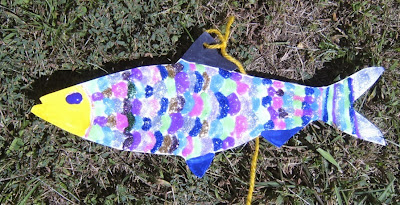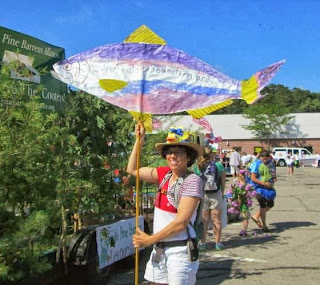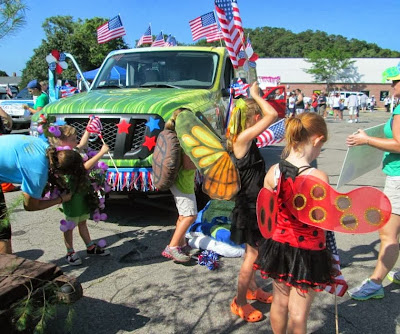Alliance Members
Back Bay Watershed Association
Eel River Watershed Association
Herring Ponds Watershed Association
Jones River Watershed Association
Neponset River Watershed Association
North and South Rivers Watershed Association
Pembroke Watershed Association
Save the Bay: Narragansett Bay
Six Ponds Improvement Association
Taunton River Watershed Association
Weir River Watershed Association
Westport River Watershed Alliance
Tuesday, September 24, 2013
Monday, September 23, 2013
Celebrating Wildlife
 |
| Iridescent river herring created by Julia at the Cape Cod Wildlife Festival Photo by Dorie Stolley |
Big thanks go to Julia and Olivia, two girls who adopted our booth and assisted for hours, cutting out fish, encouraging children, keeping the tables clean and creating their own lovely herring.
 |
| Julia and her second herring Photo by Heather Fone |
 |
| Olivia hard at work during a rare quiet moment at the booth Photo by Heather Fone |
Those who chose to keep their herring had a colorful souvenir of the day. The WAA website address was included on every fish so parents could visit it to learn about their local watershed, find simple ways to conserve water and locate fun water-related events all over southeastern Massachusetts.
Some children left their herrings for WAA. These fish will join the ever-increasing river herring school that will “march” in the July 4th parade in Plymouth with the Plymouth Nature Brigade.
The arts are used in many ways to stimulate environmental stewardship, conservation and activism. WAA’s decorate-a-herring activity promotes emotional connection to and aesthetic appreciation of native water-dependent wildlife and conveys information in a natural, storytelling fashion to children and their parents. It also promotes regional pride in an impressive fish with an evocative story whose future depends on the work of WAA, its member organizations and people who care about them and about clean water. For more information visit: www.watershedaction.org
Some children left their herrings for WAA. These fish will join the ever-increasing river herring school that will “march” in the July 4th parade in Plymouth with the Plymouth Nature Brigade.
 |
| In 2014, there will be an entire school of herring to join the WAA mascot! Photo by Lianna Lee |
 |
| Banner for the Plymouth Nature Brigade Photo by Lianna Lee |
 |
Monarch butterfly, blueberry bush, and ladybug joined the river
herring in representing Plymouth's native wild animals and plants
in the July 4th parade. Join us in 2014?
Photo by Lianna Lee |
Friday, September 20, 2013
Did You Know? How to Keep Your Watershed Healthy in Autumn
 |
| Autumn colors along the Taunton River by Bharani Padmanabhan, MD, PhD |
These easy actions help combat three common autumn issues in watersheds--low stream flow, eutrophication and bacterial contamination--and help to keep our waters beautiful and unpolluted.
Low stream flow means there is too little water in a stream, which might go completely dry, stranding fish in ever diminishing pools of water. This is not a pretty sight nor healthy.
More frequently, water is still visible in a stream, however, levels drop so low that fish and other wildlife have trouble traveling and completing critical stages in their life cycles. For instance, due to little rain and use of water in the summer, streams can drop too low for young river herring, hatched upstream in the summer, to migrate downstream to the ocean where they will grow to adulthood.
Everyone can help by conserving water in the summer and early fall, such as by using sprinkler systems in the early morning or evening rather than during midday when the heat will cause much of the water to evaporate.
In fact, this is such a simple, feasible and successful idea that the towns of Hingham, Hull and Cohasset, served by Aquarion Water Company, implemented mandatory water restrictions in early July to protect their water supply before it became critically low. Residents could only use sprinklers or irrigation systems every other day and only before 10 a.m. or after 6 p.m. North and South Rivers Watershed Association estimated that this simple procedure saved 30,000 gallons of water per day. This assured that residents would have water all summer long and that streams wouldn’t run dry. A double winner.
Eutrophication is another issue at this time of year. It happens when a water body receives too many nutrients, which causes explosive plant growth. When the plants die they sink to the bottom of the water body where bacteria feed on them. This process uses up the oxygen that is dissolved in the water, which can lead to fish kills. The excess nutrients are often a result of human activities. For example, fertilizer from farm fields or lawns, sewage from faulty septic systems or leaky sewer pipes and pet waste can all contribute to nutrient overloading in water bodies.
Fortunately, there are some easy ways for everyone to help solve this problem. These include: decreasing fertilizer on lawns (or not using any), getting septic tanks inspected and pumped on a regular schedule (every three to five years is recommended), and picking up pet waste.
The third watershed issue in the late summer and early autumn is bacterial contamination. Many beaches are closed to swimming in the summer because of high bacteria counts, which can continue into the fall, often not noticed because monitoring stops, beaches close for the season and fewer people are swimming. Bacteria in the water can cause many undesirable problems including eye, ear and stomach infections.
There are two important ways to help solve this problem: getting your septic tank pumped out on a regular schedule and picking up pet waste. Sound familiar? These actions both reduce bacterial contamination and nutrient overloading.
For more ways to help your watershed all year long, visit: http://watershedaction.org/index.php/take-action/at-home.
Sunday, September 8, 2013
Subscribe to:
Posts (Atom)


